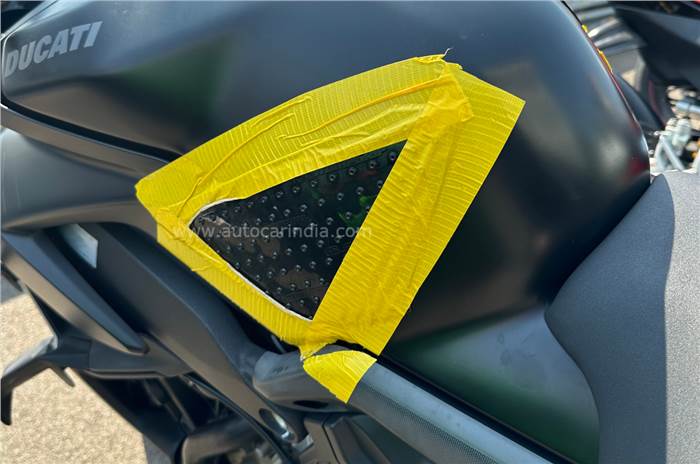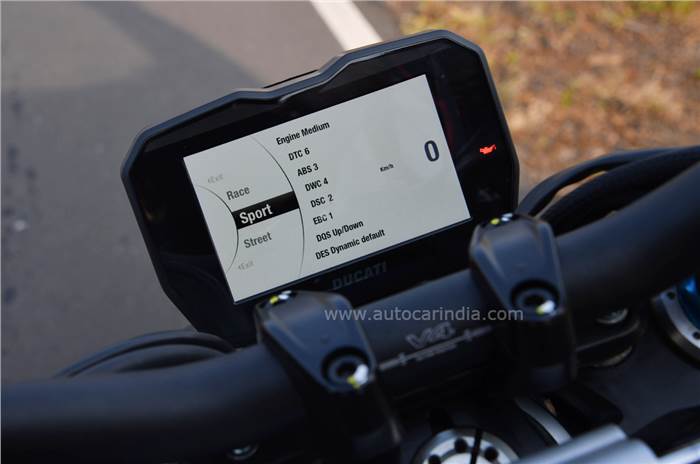Ducati Streetfighter V4 S track review: Upright superbike
While it does have a handlebar and is sans fairing, the Ducati Streetfighter V4 is still a phenomenal track tool.
Published on Mar 26, 2023 07:00:00 AM
11,106 Views
Follow us on



The Streetfighter V4 has lived in my head ever since I spent a memorable few days with it for our road review in late 2021. There is nothing else like this bike with its Italian design, streetnaked usability and 208hp that arrives at 14,500rpm. Those last four thousand revs are a violent thrill you can never forget...
When the chance to attend Level 4 at California Superbike School came up, I really wanted to do it on a properly fast motorcycle. A call to the generous folks at Ducati India revealed that the Streetfighter V4 was available and that I’d get it with a fresh set of Pirelli Supercorsas - yummy!
At its core, the SFV4 is very close to being a naked Panigale V4 without the fairing and clip-ons. And therein lay the first and biggest challenge I faced - holding on. With nothing to shield you from the wind, your lower body needs every bit of assistance it can get when it comes to anchoring to the bike. If you plan on riding your Streetfighter quickly, it's really worth sticking grip tape of some sort on the fuel tank for your knees and thighs to hold onto.

With that sorted out, I could focus my three days at the school on picking up the lessons and trying to exploit the bike to the best of my ability. I headed out for the first session in Street mode just to get used to the bike and being back at the Madras Motor Race Track. In less than half a lap, it became clear that the suspension in Street mode was too soft. This instantly reminded me why the bike felt so surprisingly absorptive on the street, but on the track, it just felt loose, sloppy and tough to turn.
Since this was the V4 S, it came with electronically adjustable semi-active Ohlins suspension and just a few button pushes in the middle of the circuit helped switch to Sport mode. This significantly firmed things up and immediately cured the problem. That sort of convenience is amazing if (like most people) you don’t have much knowledge about suspension set-up.
Still, if you like, you can switch the suspension into a static, manual mode whereby you decide how much compression and rebound damping to use at both ends. Since I was at a riding school, I decided to leave the suspension to its own semi-active devices in Dynamic mode so I could focus on the riding lessons. The bike behaved well, but I did have to make a few adjustments to the suspension, which you’ll read about further down.
208hp is every bit as extreme as you might imagine and the full-frontal battle with the wind means that you feel the speed all the more. On the relatively short straights at the MMRT, I could easily keep up with (or even pass) any of the litre class superbikes because you never go much higher than 200kph. Still, this alone was quite physically demanding, and I don’t want to imagine what it would be like down the 300kph back straight at the BIC…

Despite the mental power delivery, the throttle mapping is very good, and the engine feels smooth at high revs as well. The throttle in Race mode felt too sharp, so I dialled the engine responses back to Sport (full power, but smoother response) but kept all the other parameters like traction and wheelie control in the standard Race mode settings.
As amazing as the Ducati’s power feels, at the end of a 3-day track day/riding school, I’m almost equally impressed with the electronics. The beauty is that you just don’t feel them. It was only after studying the on board Go-Pro footage of my laps where I could see the little orange light flicker every now and then. What was most impressive was how those electronics saved what would have otherwise been a wasted day on a bike that didn’t have them.
By the end of day two, I noticed that the 200/60 rear Pirelli Supercorsa was quite shot. There was a literal trench dug into the right side where I would get on the power coming out of corners and the tyre was looking quite worse for wear, although some changes to air pressures and suspension settings also helped. Still, without those electronics having my back I’d have been a nervous wreck, and I’m sure I wouldn’t have ridden as fast as I’d have wanted to. But day three ended up being just as good as the earlier two and I had zero scary moments of the rear threatening to break loose. In fact, I never even had to raise the TC from level 3 out of 8 where it was set all weekend.
The electronics are a superb value addition that let us mortals safely enjoy the sort of power that should high side you straight into a hospital bed. It was startling/ridiculous/hilarious/awesome to feel the Streetfighter’s handlebar occasionally sway left and right when powering out of corners onto the straights, but the electronics gave me the confidence to keep the throttle open in situations like that.
At 199kg, the SFV4 weighs about as much as most litre class superbikes and at a relatively smaller track like the MMRT, it feels like a big bike. You won’t be able to bomb into corners like you’d do on something small like a KTM 390 and such a fast bike needs a different approach to lines. Unlike the small bikes where you want to maximise corner speed, with this kind of performance, you want to pick a line that lets you explode out of the corner as fast as possible.
I still don’t think I’ve fully wrapped my head around how hard the V4 accelerates and I eventually stopped revving it to the redline simply because I wasn’t fit enough to cope. Thankfully, the brakes are just mega, both in terms of feel and stopping power and the ABS system never feels rudely intrusive, even when you do manage to trigger it.
As the pace rose over the weekend, the zip-tie I cinched around the fork leg showed that the front end was bottoming out under braking. This is not ideal, so I went into the custom section of the dynamic suspension and added some front braking support which solved the issue.

At the start of day 3, I also suspected that the rear tyre had degraded so quickly because the air pressure was too low. Track regulars had recommended that I go with 26 cold at the rear, but I think the soft carcass Pirelli tyres need a higher pressure. Bumping the rear up to 28 cold and adding in some rear shock support through the TFT dash allowed the tyre to keep its shape better and not get squished as much under acceleration. This definitely helped to heal much of the deep groove that had formed on day two. Still, the tyre was pretty much finished on the third day, so be prepared for huge tyre bills if you plan to track your 200 horsepower motorcycle at a quick pace.
Beyond the obvious compromises with wind protection, you’ll also notice the footpegs may occasionally touch the tarmac. To be fair, this mostly happened when I went a little too deep into a corner on a closed throttle - sloppy technique that effectively reduces the bike’s cornering clearance. At my pace, the footpegs weren't a hindrance, but pro riders will want more clearance.
Ultimately, the Streetfighter V4 is a superbly capable track bike and its limit lay far higher than what I could achieve. Without having to politely pass the traffic of other students learning at their own pace, I’d have been setting lap times in the late one minute fifties. That’s a brisk pace, but I know that a proper racer like Rajini Krishnan will take that number down to the low one fifties, if not even more so! This is one seriously fast motorcycle.
I won’t lie, the lack of wind protection is a challenge, and the wide handlebar makes it easy to make inputs that you shouldn’t, but at the same time, the more comfortable riding position is much easier to live with over a few days on the track. It’s a give and take, and I think these flaws also give the bike a cheeky, fun personality where something like a Panigale would feel a lot more serious.
Given just how usable the SFV4 proved to be on the road, I’m now even more in awe of its capabilities. Its Rs 25.5 lakh ex-showroom price is huge, its power is absolute overkill and it is an exotic, high strung machine, but like I ended my road review over a year ago - what an incredible indulgence this bike is.
Also See:
Copyright (c) Autocar India. All rights reserved.



Comments
Member Login
Personal Details
No comments yet. Be the first to comment.